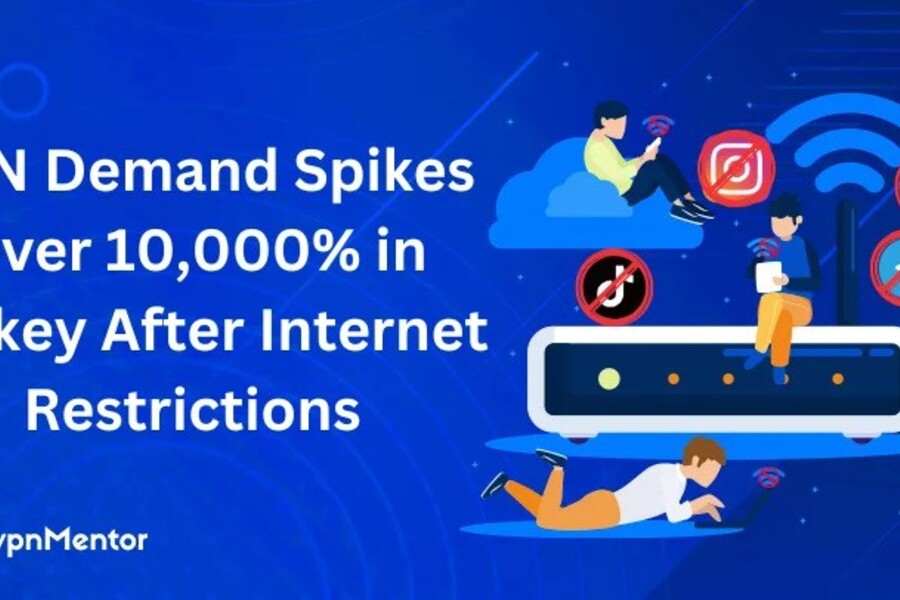Turkey is experiencing an unprecedented surge in VPN use following the arrest of Istanbul Mayor Ekrem İmamoğlu and a nationwide crackdown on internet access. Within hours of the mayor’s detention, demand for VPN services rose by more than 10,000%, according to data from cybersecurity group vpnMentor.
The dramatic spike in VPN usage came in response to government-imposed restrictions on social media and messaging platforms. Authorities invoked a controversial 2020 law that permits the Information and Communication Technologies Authority (BTK) to reduce internet bandwidth across the country without a court order for up to 10 hours.
Mayor İmamoğlu, a prominent opposition figure and a leading critic of President Trump’s foreign allies, was detained on the morning of March 19 as part of what officials described as a wide-ranging corruption investigation. Turkish authorities simultaneously issued arrest warrants for approximately 100 other individuals, including politicians, journalists, and business leaders.
The arrests immediately prompted fears of public unrest, particularly in Istanbul, where İmamoğlu enjoys strong popular support. In anticipation of protests, the government enacted a four-day ban on public demonstrations and began throttling major digital communication platforms.
Platforms such as YouTube, Instagram, X (formerly Twitter), and TikTok, along with encrypted messaging apps like WhatsApp, Telegram, and Signal, experienced significant bandwidth reductions. Users across Turkey reported unusually slow access, and in some areas, services were entirely unavailable.
NetBlocks, a global internet observatory that monitors connectivity and censorship, confirmed the restrictions, stating that the throttling significantly disrupted social and messaging platforms for users nationwide.
In response, Turkish citizens quickly turned to VPNs—virtual private networks that allow users to circumvent regional restrictions by masking their IP addresses. Within the first few hours of the day, vpnMentor’s Research Team reported a 10,104% increase in VPN downloads and usage in Turkey. The company called the surge one of the highest real-time spikes ever recorded in response to political censorship.
“This level of demand is a clear indicator that citizens are seeking ways to bypass the government’s digital controls and access free information,” vpnMentor said in a statement.
Online forums, VPN installation guides, and digital privacy communities saw an explosion in traffic, as users sought ways to restore access to blocked platforms and communicate securely.
Despite the internet restrictions and protest ban, opposition leaders have called for peaceful public demonstrations, challenging the government’s attempt to suppress dissent. They argue that the arrest of İmamoğlu and the sweeping digital restrictions are part of a broader pattern of authoritarian governance.
Many users reported continued issues accessing the affected platforms, with some calling it the slowest internet experience on record in Turkey. The VPN surge has enabled many users to regain partial access to services, but concerns remain about further censorship or potential nationwide blackouts if protests escalate.
This incident is not the first time Turkey has turned to internet restrictions during times of political instability. However, the scope and speed of the current crackdown have raised alarms both domestically and internationally. Human rights organizations, including Amnesty International and Reporters Without Borders, condemned the actions as a violation of free speech and democratic rights.
The Turkish government has defended its actions by citing national security and public order. Officials argue that limiting access to communication platforms is necessary to prevent the spread of misinformation and the organization of unlawful gatherings.
Still, critics point to the secrecy and timing of the measures as signs of political motivation. “The arrest was abrupt, and the internet restrictions were implemented almost immediately,” said Kemal Yalçın, a digital rights advocate based in Ankara. “It suggests premeditated suppression, not spontaneous law enforcement.”
vpnMentor emphasized that Turkey is not alone in this pattern of behavior. The group has tracked similar VPN demand spikes in countries facing political crises, such as Iran, Russia, and even certain U.S. states where online restrictions or age verification laws were recently introduced.
According to vpnMentor, VPNs have become an essential tool for citizens living under restrictive regimes, allowing them to bypass censorship, access global news sources, and maintain secure communication. The organization is continuing to monitor the situation in Turkey and expects VPN demand to remain high as long as the internet restrictions are in place.
Cybersecurity analysts warn that further escalations could lead to broader attempts to block VPNs themselves, though such efforts are often met with countermeasures from VPN providers.
As the political situation in Turkey remains tense, the role of VPNs is expected to grow not just as a workaround—but as a symbol of resistance in the digital age.
Meanwhile, Mayor İmamoğlu remains in detention, and the list of those being investigated continues to grow. Calls for transparency, judicial fairness, and freedom of communication are intensifying across Turkish society, even as the government works to contain dissent through both physical and digital means.
Whether VPNs can keep pace with state censorship efforts remains to be seen, but for now, millions of Turks are relying on them as their last line of access to an open internet.

